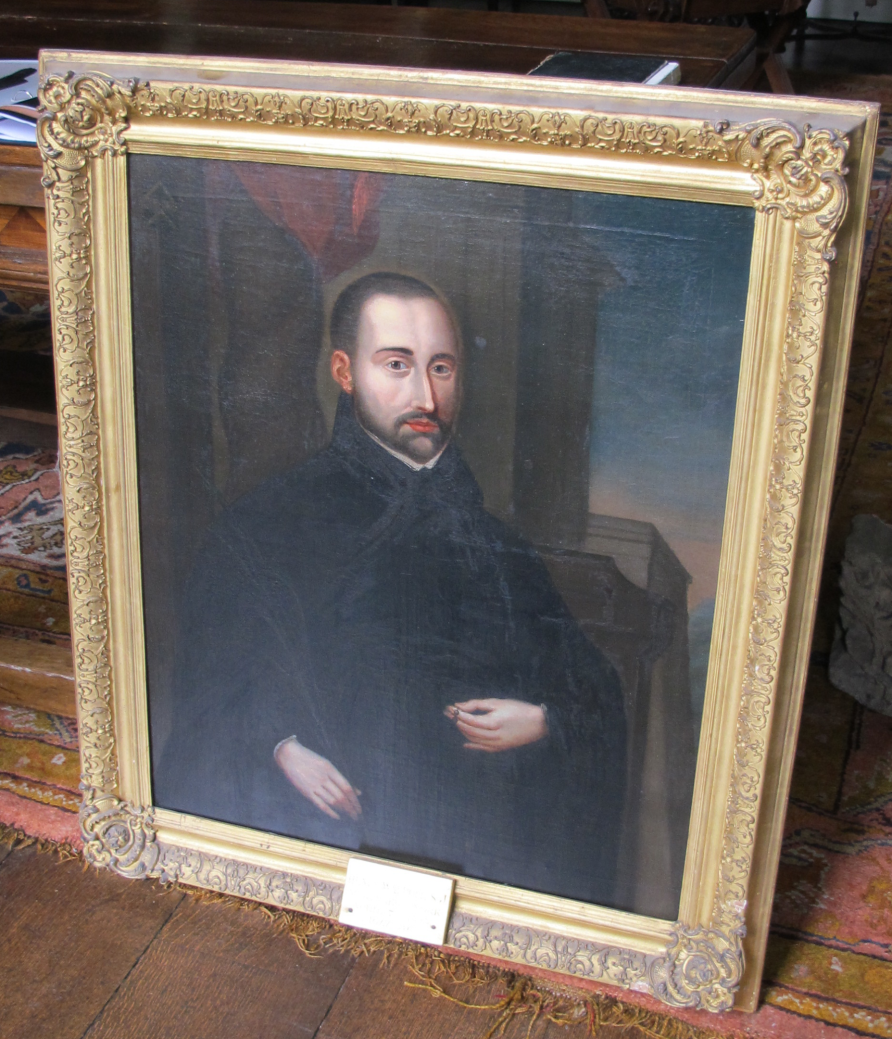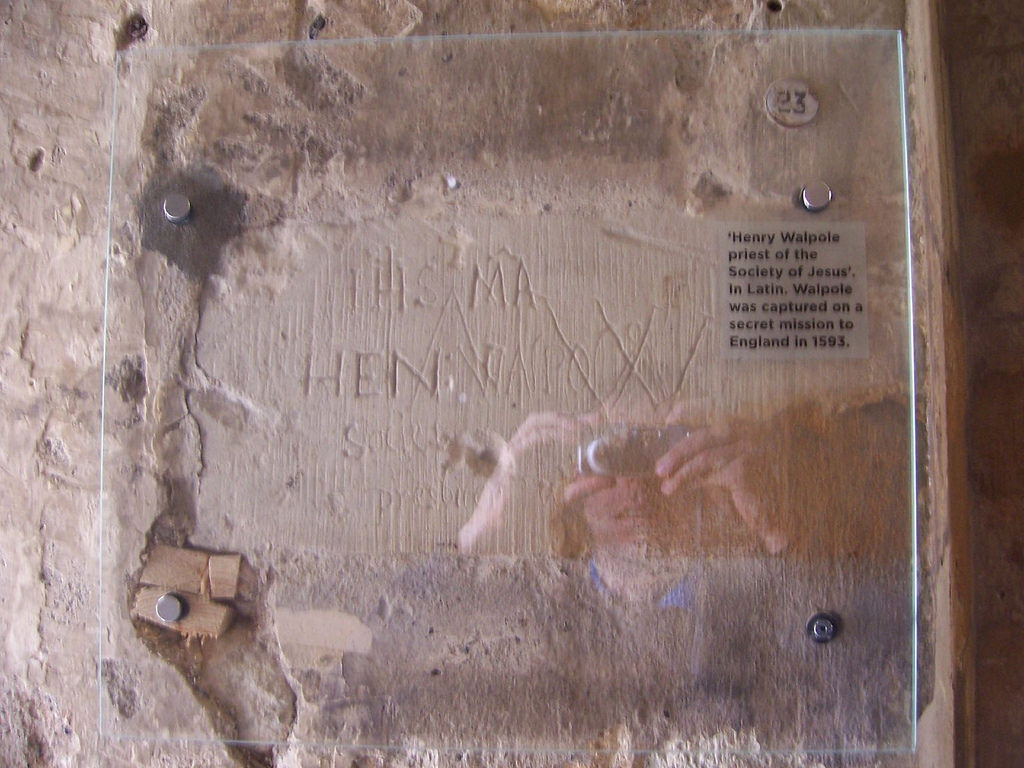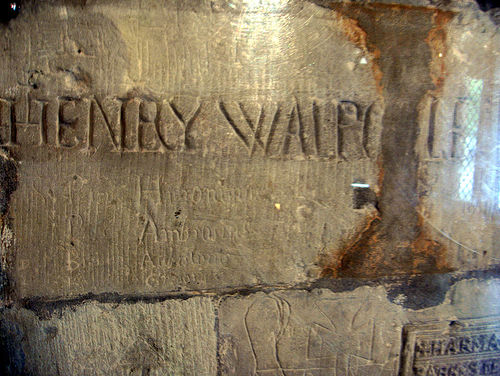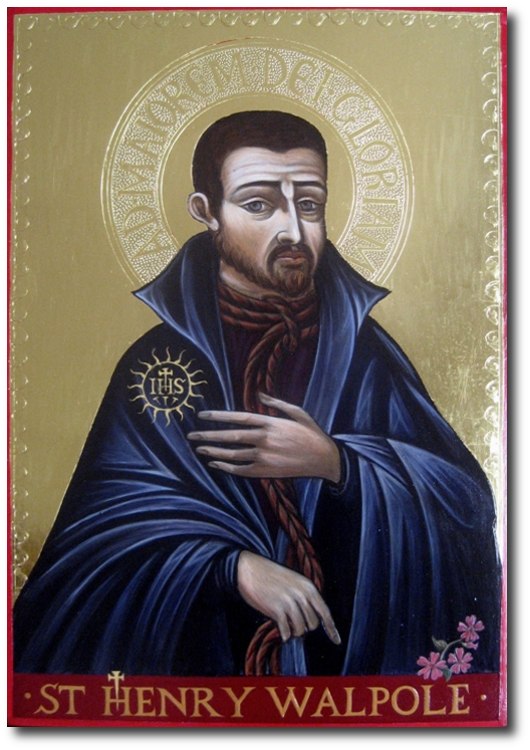Son of Christopher & Margery, from a large family of boys, witty & bon vivant, in his early twenties, Henry Walpole was indifferent to sufferings of his fellow Englishmen for their beliefs until he attended the execution of the well known Edmund Campion, SJ, and blood from the martyr fell upon him. A baptism? Surely. Of the most profound kind. Henry Walpole was inspired by the courage of the Jesuit martyr to become a priest for his native England. A conversion had begun…deep and profound. Falling in love.
He was arrested, however, almost as soon as he set foot on English soil and spent more time being tortured in prison than some Jesuits spent ministering the sacraments. Walpole had been born Catholic but was not sure which direction to follow in the religious controversy that roiled England. He attended the discussions that Campion held with Anglican divines and been impressed with the Jesuit’s zeal and preaching. He was also present at the Jesuit poet’s execution. A drop of Campion’s blood fell on his clothes from the martyr’s quartered body, confirming his sense that God was calling him to follow in Campion’s footsteps. He even wrote a poem honoring the dead Jesuit.
“Why do I use my paper, ink and pen?
Or call my wits counsel what to say?
Such memories were made for mortal man,
I speak of saints, whose names cannot decay.
Angel’s trump were meter far to sound
Their glorious deaths, if such on earth were found.
His native flowers were mixed with herb of grace.
His mild behavior tempered well with skill.
A lowly mind possessed a learned place.
A sugared speech, rare and virtuous will.
A saint like man set in earth below.
The Tower says the truth he did defend,
The Bar bears witness of his guiltless mind.
Tyburn doth tell, he made a patient end.
In every gate his martyrdom we find
In vain you wrought, that would obscure his name,
For heaven and earth will still record the same.
You thought perhaps when learned Campion dies,
His pen must cease, his sugared tongue be still.
But you forget how loud his death it cries,
How far beyond the sound of tongue and guile.
You did not know how rare and great and good,
It was to write his precious gifts in blood.”
Walpole studied at Cambridge and then moved to London to study law, but then changed direction and decided to become a priest. Described a year later after witnessing Campion’s execution as “discreet, grave, and pious”, he entered the English College in Rheims, France in July 1582 and then moved to Rome nine months later. On Feb. 4, 1584 he joined the Society of Jesus and completed his studies at the Scots College at Pont-à-Mousson, France. After he was ordained in Paris, he was assigned to be chaplain to English Catholic refugees serving in the Spanish army in the Low Countries.
He spent a year in prison after he was captured by the Calvinists in 1589, and then worked at the English seminary in Valladolid, Spain until he was finally asked to return to England in 1593. The Jesuit, his brother and an English soldier sailed together on a French ship headed for Scotland because the southern ports of England were closed because of the plague.
On Dec. 4, 1593, the three passengers were put ashore at Flamborough Head, Yorkshire, after 10 days of stormy sailing, but separated on land. Father Walpole was resting at an inn 10 miles inland when he was arrested for being a priest; he had been betrayed by a fellow passenger who was earning money to buy his way out of prison.
One night of freedom in England was followed by 16 months of imprisonment. Walpole admitted during his first interrogation that he was a Jesuit and had come to England to convert people. He was transferred to York Castle for three months, and was permitted to leave the prison to discuss theology with Protestant visitors. Then he was transferred to the Tower of London at the end of February, 1594, so that the notorious priest-torturer Richard Topcliffe could wrest information from him. Walpole was tortured brutally on the rack and was suspended by his wrists for hours, but Topcliffe stretched the tortures out over the course of a year to prevent an accidental death. While still able to write, Henry wrote to a fellow Jesuit at a monastery in Yorkshire about his ordeal, he wrote: “…I hope, through the merits of my most sweet Saviour and Lord, that I shall be always ready, whether living or dying, to glorify Him, which will be for my eternal happiness.”
Walpole endured torture 14 different times before being returned in 1595 to York to stand trial under the law that made it high treason for an Englishman simply to return home after receiving Holy Orders abroad. The man who had once aspired to be a lawyer defended himself ably, pointing out that the law only applied to priests who had not given themselves up to officials within three days of arrival. He himself had been arrested less than a day after landing in England, so he had not violated that law. The judges responded by demanding that he take the Oath of Supremacy, acknowledging the queen’s complete authority in religion. He refused to do so and was convicted of high treason.
On April 7, Walpole was dragged out of York to be executed along with another priest, Bl. Alexander Rawlins of the Diocese of Gloucester, who was killed first. Then the Jesuit climbed the ladder to the gallows and asked the onlookers to pray with him. After he finished the Our Father but before he could say the Hail Mary, the executioner pushed him away from the ladder; then he was taken down and dismembered. In St Henry Walpole, SJ, Catholics received yet another example of fidelity and courage.
When asked to join in prayer with Protestants for his own peaceful death he said “that by the grace of God he was in peace with all the world, and prayed God for all, particularly those who were the cause of his death; but as they were with them; yet he heartily prayed for them, that God would enlighten them with His truth, bring them back to His Church, and dispose them for His mercy” …he also prayed: “…may His Divine Majesty never suffer me to consent to the least thing by which He may be dishonored, nor you to desire it of me, and God is my witness, that to all here present, and particularly to my accusers, I wish as to myself the salvation of their souls, and to this end they may live in the true Catholic Faith, the only way to eternal happiness.”

– Henry Walpole, SJ, artist unknown, from the Plaid Bedchamber of Strawberry Hill House

-“Henry Walpole, priest of the Society of Jesus” in Latin. Please click on the image for greater detail.

-inscription left by St Henry Walpole, SJ, in his prison cell in the Salt/Beauchamp Tower, Tower of London. Below his name, more lightly inscribed, he imprinted the Latin names of Sts Paul & Peter, along with those of Sts Jerome, Ambrose, Augustine, & Gregory, four Doctors of the early Church.
Henry Walpole, SJ’s ghost supposedly haunts Anmer Hall, where William & Kate, Duke & Duchess of Cambridge, are happy to raise Prince George.
Almighty and everlasting God,
Who kindled the flame of Your love in the heart of Your holy martyr
St Henry Walpole, SJ,
Grant to us, Your humble servants,
a like faith and power of love
that we who rejoice in their triumph may profit by their example;
through Jesus Christ our Lord,
Who lives and reigns with You and the Holy Spirit,
one God, for ever and ever. Amen.
Love,
Matthew


